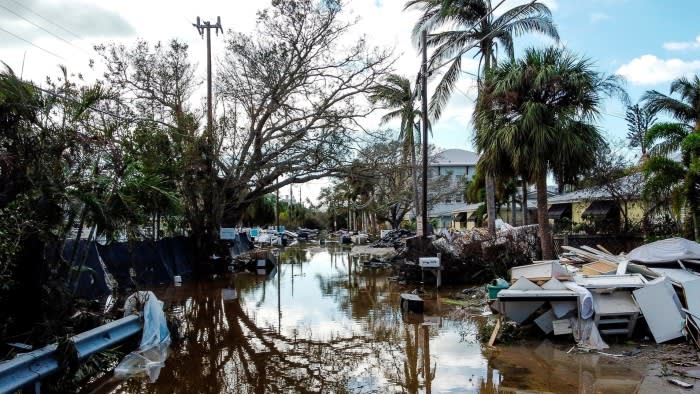Unlock the US Election Countdown newsletter for free
The stories that matter on money and politics in the race for the White House
The intensity of the deadly hurricane that hit Florida this week and left millions without power was worsened by human-driven climate change, a group of international scientists has found.
Global warming made the winds associated with Hurricane Milton about 10 per cent stronger and increased rainfall by 20-30 per cent, according to a rapid analysis by the World Weather Attribution group.
Milton, which made landfall in Florida’s Sarasota County as a category 3 storm, is the second hurricane to hit the southern US in a fortnight and triggered tornadoes across the state.
It comes after Hurricane Helene wreaked havoc across several south-eastern states two weeks ago, killing more than 225 people and destroying roads across western North Carolina.

Scientists have found that climate change is increasing the intensity of hurricanes. Higher ocean temperatures caused by global warming also allows storms to pick up more moisture, which is released as rain when they move over land.
“The total number of hurricanes is not expected to change, but the number of very strong hurricanes (category 4 or 5) is,” said Karsten Haustein, a climate scientist at Leipzig University. “Hurricanes require a moist atmosphere, warm ocean temperature and little wind shear.”
Haustein said Milton had been the “perfect example” of the tendency of hurricanes to “grow stronger quicker” as the planet warms.
But on Thursday, the Republican governor of Florida, Ron DeSantis, pushed back on the connection between global warming and hurricanes. “There is nothing new under the sun, this is something the state has dealt with for its entire history,” he said.
President Joe Biden will travel to Florida on Sunday to survey the damage, the White House announced on Friday. Biden and vice-president Kamala Harris have criticised former president Donald Trump a number of times for spreading misinformation about the government’s recovery efforts.

Biden this week urged the US Congress to return to Washington from its recess and address disaster relief funding “immediately” — although he said that the Federal Emergency Management Agency had the money it needed to deal with the aftermath of Helene and Milton.
On Friday he said experts had estimated Milton had caused $50bn in damage.
Hurricane Milton was the third-most rapidly intensifying Atlantic hurricane on record, according to the US’s National Oceanic and Atmospheric Administration. It grew to be a category 5 hurricane with wind speeds reaching 180mph, then weakened to a category 3 storm before it reached land.
Milton is also the second hurricane to reach category 5 status this year. According to the Noaa there have only been five other years since 1950 in which more than one category 5 storm registered.
Homeowners in Florida returned home from shelters on Friday to assess the damage inflicted by the storm. More than 2mn people were still without power, according to the utility-tracking website poweroutage.us.
Because of contaminated water supplies, more than 260,000 people in the coastal city of St Petersburg were asked to boil water before cooking and drinking it.
Florida’s busiest airports — including Orlando international and Southwest Florida international — reopened for both domestic and international flights on Friday.


